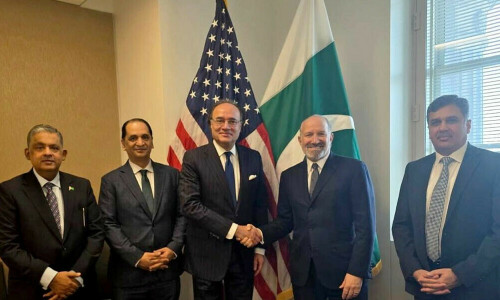Pakistan and US Finalize Landmark Economic Agreement
Pakistan and the United States have reached a significant economic accord, poised to decrease tariffs on Pakistani exports and facilitate the exploration of Pakistan’s untapped petroleum resources.
Analysts are celebrating this development as a victory for Pakistan, anticipating extensive advantages across commerce, energy, and technological advancement.
The US President stated on social media, “The United States and Pakistan have reached an agreement for collaboration on developing Pakistan’s significant oil reserves. We are currently in the process of selecting the oil firm that will spearhead this venture.”
Pakistan’s Finance Minister Muhammad Aurangzeb characterized the trade arrangement as mutually beneficial in a recent address.
He stated, “The strategic alliance between Pakistan and the United States has significantly advanced.”
This agreement is finalized just before the expiration of a temporary suspension of a proposed tariff that had threatened to negatively impact Pakistan’s export earnings.
According to Sana Tawfik, Head of Research at Arif Habib Limited, the agreement is anticipated to reduce the tariff rate, thereby greatly alleviating potential export deficits.
Tawfik noted that the imposition of the previously proposed tariff could have resulted in substantial losses in annual export revenue for Pakistan.
She affirmed that this agreement will assist in minimizing such losses.
In 2024, the total trade in goods between Pakistan and the US was approximately $7.3 billion, an increase from about $6.9 billion in the prior year. The US trade shortfall in goods with Pakistan amounted to $3 billion during the same period, marking an increase from 2023.
Experts have described the agreement as an economic and strategic accomplishment.
Samiullah Tariq, Head of Research at Pak-Kuwait Investment, lauded the development as advantageous for the nation and its industries.
Saad Hanif, Head of Research at Ismail Iqbal Securities, commended the agreement as a notable diplomatic achievement.
Saad emphasized that Pakistan has accomplished multiple objectives simultaneously by both securing trade relief and tapping into oil reserves through a significant diplomatic endeavor.
He further commented that this agreement is expected to enhance bilateral economic relations, with Pakistan standing to gain from decreased tariffs on its exports to the US, thereby bolstering its trade competitiveness and safeguarding market access.
Saad noted that a pivotal aspect of the agreement is the US commitment to aid in the development of Pakistan’s oil reserves, underscoring a robust endorsement of the nation’s energy prospects.
He added that both nations have agreed to broaden cooperation across vital sectors such as IT, digital infrastructure, mining, and cryptocurrency, fostering greater investment and technological partnerships.
Saad also remarked that the agreement not only solidifies Pakistan’s strategic stature in the region but also signifies growing economic convergence with the US, particularly as Washington reassesses its trade relationships with other economies in South Asia.
Tawfik added that broader economic effects are anticipated through this agreement, notably in sectors including energy, minerals (such as Reko Diq), and agriculture.



Comments (0)
No comments yet. Be the first to comment!
Leave a Comment